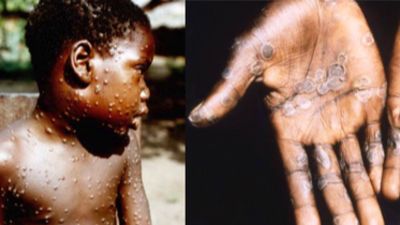Monkeypox 'outbreak' in north Wales as two treated for rare viral infection

An "outbreak" of the rare viral infection monkeypox has been detected in north Wales, the health secretary has revealed while giving evidence to MPs.
Public Health Wales (PHW) confirmed two members of the same household had developed the illness - which sees people suffer aches, a fever and a rash which scabs over - after one of them caught it while abroad.
The illness is mainly reported in central and western Africa.
PHW said it was working with Public Health England (PHE) and that both people had been treated in hospital in England, where one remains.
Monkeypox does not spread easily between people and the risk to the general public is low.
While being questioned by MPs on the government's response to Covid-19 and in particular the track, trace and isolate system, Matt Hancock said: "The tracing and isolation system was essentially built for very important but very small outbreaks.
"As health secretary you're dealing with these sorts of outbreaks all of the time.
"I'm currently dealing with a monkeypox outbreak and cases of drug-resistant TB and that is absolutely standard and the lack of that capability at the start meant that the options that we had were fewer."
Health Secretary Matt Hancock confirms "monkeypox outbreak" in the UK
PHW said contacts of the two patients were being traced.
Richard Firth, Consultant in Health Protection at Public Health Wales, said: "Confirmed cases of monkeypox are a rare event in the UK and the risk to the general public is very low.
“We have worked with multi-agency colleagues, following tried and tested protocols and procedures, and identified all close contacts.
"Actions have been put in place to minimise the likelihood of further infection.
“Monkeypox is a rare disease caused by the monkeypox virus and has been reported mainly in central and West African countries.
“Monkeypox, in most cases, is a mild condition which will resolve on its own and have no long-term effects on a person’s health.
"Most people recover within a few weeks.”
What is monkeypox?
Monkeypox is a rare viral infection, which does not spread easily among people and the general risk to the public is low.
The majority of recent cases have been reported in central and west African countries.
Generally, it is a mild condition which resolves itself and has no long-term impact on a person's health.
Usually, a sufferer fully recovers within a few weeks.
Early symptoms include fever, headache, muscle aches, backache, swollen lymph nodes, chills and exhaustion.
In certain cases, a rash develops which often begins on the face before spreading to other parts of the body.
The rash changes from raised red bumps to spots filled with fluid. The spots eventually form scabs which later fall off, according to the NHS website.
How can you get monkeypox?
The orthopoxvirus is mostly transmitted to people from wild animals such as rodents and primates, but can be passed from human to human.
The death rate is much lower than other similar diseases, such as smallpox.
A person can get it by coming into contact with items used by an infected person, touching the spots or scabs of the sufferer, or if a person who has monkeypox coughs or sneezes near you.
The World Health Organization describes monkeypox as similar to human smallpox and although it is much milder, it can be fatal.
Back in December 2019 a person in England was diagnosed with monkeypox and was treated at the specialist high consequence infectious disease centre at Guy's and St Thomas' NHS Foundation Trust in London.
The patient was believed to have contracted the infection while visiting Nigeria.
A year before this, in September 2018, three cases of monkeypox were reported in the UK.
The first two were in people who had travelled from Africa and the third was a healthcare worker who cared for one patient.
The worker became infected before monkeypox was suspected.